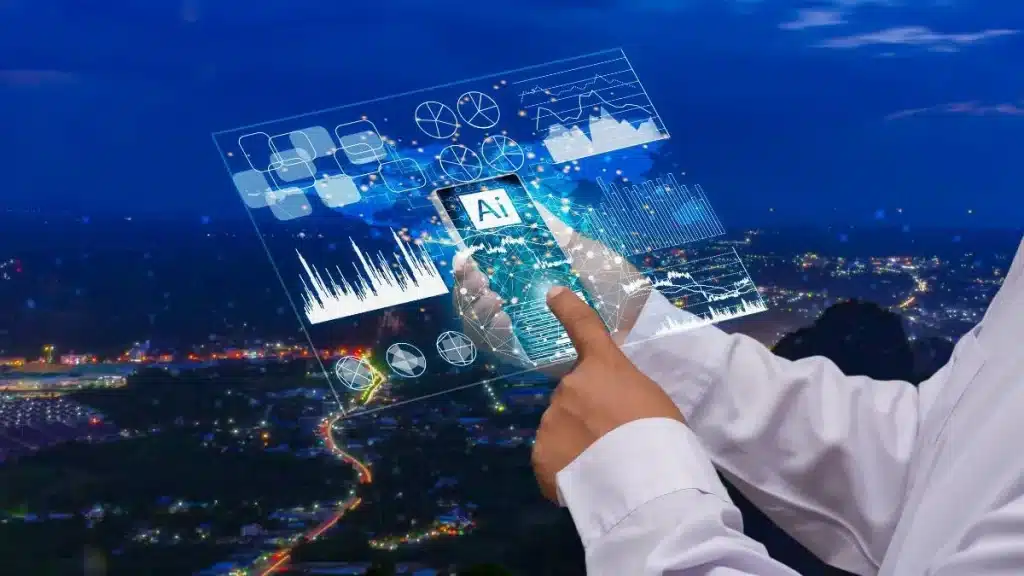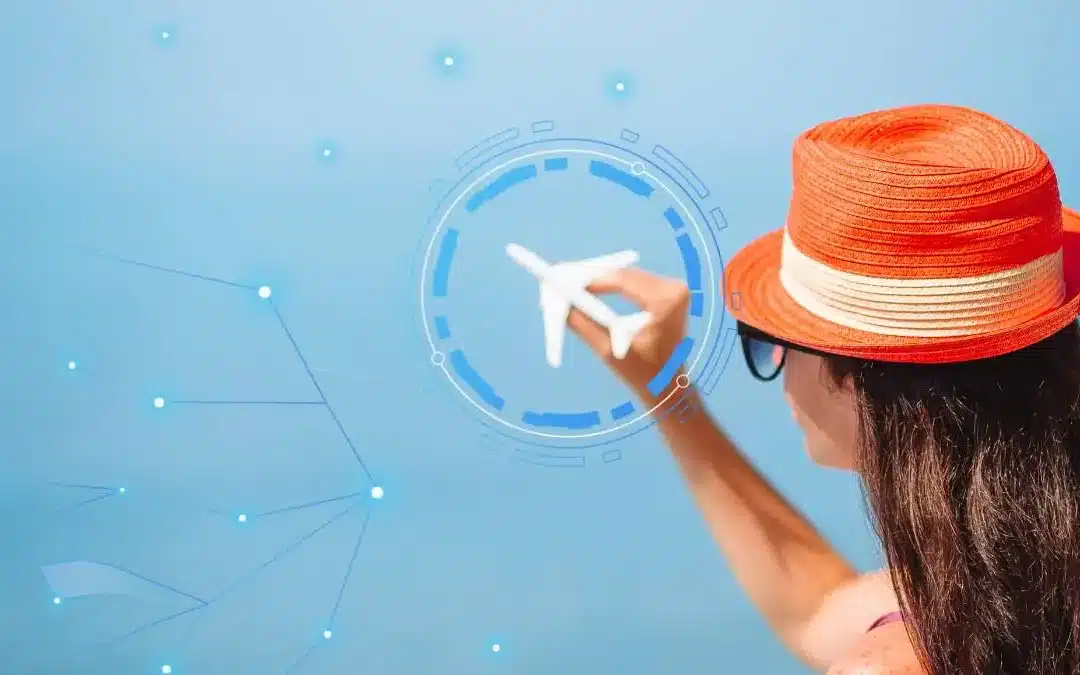Artificial intelligence in tourism offers innovative solutions that improve operational efficiency, personalize the customer experience and optimize decision-making processes.
According to a Gartner survey, 85% of interactions in the tourism sector will be managed without the help of human personnel, thanks to the use of AI chatbots capable of reducing waiting times, working according to customer satisfaction.
The global AI market in the tourism sector is expected to reach 5.2 billion dollars by 2030, with an average annual growth of 16.3% between 2023 and 2030.
According to Eurispes data, 61% of large Italian companies have already started at least one AI project. Among SMEs, however, only 15% have at least one AI project started. Travel companies that have implemented AI for booking automation and data management have seen an average 20% increase in profits and a 15% reduction in operating costs.
The application of generative artificial intelligence in tourism, in particular, allows for increased service levels, operator productivity, and the personalization of offers and user experience.
In this article, we examine the areas of application of chatbots in the travel industry, delving into the opportunities offered by Large Language Models.
Updated on June 4th 2025
Estimated reading time: 9 minutes
Table of contents
Artificial Intelligence Trends in Tourism According to Deloitte

- Increasing demand: Travel volumes continue to exceed pre-pandemic levels. 28% of travelers significantly increased their budget in 2024 compared to the previous year, with an average increase in planned trips and length of stays.
- AI and Generative AI accelerating: Artificial intelligence is already being applied in customer service, operational optimization, predictive maintenance and personalized communications. Travelers’ adoption of GenAI for travel planning doubled in one year, from 8% to 16%.
- AI-driven experiences: 65% of GenAI users chose activities and attractions suggested by the tools, 57% destinations and 45% booked accommodations recommended by the AI.
- Micro-merchandising and personalization: Airlines, hotels and OTAs are focusing on personalized offers, ancillary sales and tailor-made services (“modern retailing”). AI technologies, in particular, help identify what to offer, to whom, and when.
- The human factor remains central: although automation and AI agents improve the customer journey, travelers continue to prefer human interaction at key moments such as check-in and local recommendations.
- Barriers to AI adoption: Among the main obstacles are: data quality and fragmentation, outdated infrastructure and implementation costs. However, companies are investing in strategic partnerships and modular solutions to overcome these limitations
Artificial Intelligence in Tourism with Large Language Models
In Italy, only 9% of travelers are already using generative AI to plan a trip.
However, according to the report Navigating the Future: How Generative Artificial Intelligence is Transforming the Travel Industry by Amadeus (2024), generative artificial intelligence is profoundly redefining the operating methods of the tourism sector, marking a real revolution. This is not a simple incremental improvement, but a paradigm shift that concerns the entire travel experience, from booking to post-stay.
The main changes found include:
- Automated and continuous customer care: 53% of tourism companies already use generative AI for digital assistance to travelers during booking, and 44% also during the trip, offering 24/7 support via advanced chatbots.
- Personalized recommendations: 48% of companies use AI to suggest activities, destinations or experiences based on individual customer preferences, improving engagement and conversion.
- Content creation and dynamic marketing: 47% use AI to generate tailored advertising content and promotional copy, while 35% use it for dynamic pricing strategies and targeted ads.
- Operational efficiency: 41% use generative AI to streamline internal operations and repetitive processes, reducing costs and increasing staff productivity.
The impact of artificial intelligence in tourism is not only on marketing and customer experience departments, but also on decision support, tailor-made itinerary creation, post-trip feedback collection and analysis, and real-time translation to break down language barriers.
Finally, according to the same research, over 80% of technology decision makers in tourism consider generative AI a top priority for the coming year, surpassing other technologies such as cloud or biometrics.
Applications of artificial intelligence in Tourism

Conversational chatbots and voice assistants are already a reality in hotels that aim to improve customer engagement, increase conversion rates and booking volumes, as well as personalize the entire user experience.
We can identify 5 areas:
Smart booking
Thanks to conversational interfaces that are always available 24/7, users can receive direct answers to questions about hotel services, check rates or reserve a room, reducing the abandonment rate of online bookings.
“Augmented” customer experience with Artificial Intelligence in tourism
Conversational chatbots take care of all guest requests and are able to transfer the conversation to hotel staff if necessary, as well as engage in a conversation on multiple levels by up-selling and cross-selling products; or conduct sentiment analysis through the conversational flow, without having to ask the customer the time to fill out a survey.
Data-driven marketing
The ability to collect feedback and data on the user experience through chatbots allows for the application of personalized “data-driven marketing” strategies for each customer, outlining “personas” based on their stay history, preferences, behaviors, payment methods, to whom they can propose tailor-made services and offers.
In-room Virtual assistant
Inside hotel rooms, voice assistance chatbots respond to guests’ requests in real time, forward requests to hotel staff, book services, plan itineraries and give suggestions for stays, as well as anticipating customer needs based on contextual data or previous stays.
Robot Concierge
Connie, named after the founder of one of the most famous hotel chains in the world, Conrad Hilton, is the concierge robot resulting from the collaboration between IBM and Hilton, currently used at the front desk of the Hilton McLean in Virginia. Connie acts just like a human concierge, taking care of welcoming guests, answering frequently asked questions, suggesting itineraries and giving directions by moving and pointing in the right direction, lighting up her eyes in different colors depending on the activated emotion.
What do AI agents do in the tourism industry?
AI agents – autonomous systems based on artificial intelligence that proactively interact with users or other systems – are becoming increasingly central to the travel industry. Unlike traditional chatbots, AI agents combine advanced conversational capabilities with context understanding, real-time data processing and integration with other business software.
Here are some of the main tasks performed by AI agents in travel:
- End-to-end booking management: AI agents are able to follow a complete interaction, from the initial request to the booking confirmation, including personalized suggestions, change management and post-sales support.
- Proactive support during the trip: they can send flight updates, notify in case of delays or cancellations, suggest alternatives and coordinate the itinerary based on unexpected changes.
- Up-selling and cross-selling: thanks to predictive analysis, they propose additional services (transfers, insurance, excursions, upgrades) at the right time, increasing the value of the average cart.
- Coordination between multiple touchpoints: they can integrate information from CRMs, booking engines, payment systems and travel apps to offer seamless and consistent experiences across digital and physical channels.
- Multilingual assistance: they respond in real time in different languages, improving the accessibility of the service for international customers.
These agents not only improve the customer experience, but also lighten the operational load of human staff, allowing more efficient management of seasonal peaks and a reduction in response times. The adoption of AI agents in tourism therefore represents a key piece in the digital transformation of the entire sector.
How to integrate Artificial intelligence in tourism?
Bonus Tip: Start small, with a pilot on a specific segment or service, and scale as you get results. The modular approach reduces risk and speeds time to value.
- Define the goals
Identify areas where AI can generate real value: customer service, reservations, marketing, flow management, dynamic pricing. Start from a real and measurable need
- Choose the right technology
Consider whether to adopt ready-to-use solutions (such as conversational chatbots, recommendation engines, content generation tools) or develop customized AI agents in collaboration with specialized vendors.
- Integrate data intelligently
AI only works if fed with quality data. Unify sources (CRM, PMS, booking engine, feedback, digital behaviors) in a consistent and accessible data layer.
- Ensures a seamless, omnichannel UX
AI must be integrated into every touchpoint: website, app, WhatsApp, totem in hotels, voice assistants. Focus on a continuous and coherent experience, without interruptions between physical and digital.
- Constantly monitor and improve
AI is not static: observe the results (engagement, conversions, customer satisfaction), collect feedback and optimize the models. Continuous learning is the key.
Conclusions
Artificial intelligence in tourism sector offers powerful tools to improve efficiency, personalize the customer experience and remain competitive in a constantly evolving market.
All this does not go to the detriment of the human relationship, but relieves the front desk service from the alienation of repetitive requests, allowing it to focus on the quality of service and reducing waiting times.
The central user experience for the hotel industry is discovering in AI a fundamental ally to rise to the highest levels, covering transversally the moment of booking up to the experience of the stay, while providing the hotel management with valuable data through which to constantly improve their services, anticipating the demand and personalizing it to the individual user.
FAQs about the use of artificial intelligence in tourism
AI personalizes the customer experience through tailored recommendations, 24/7 support, and more efficient interactions, increasing satisfaction and loyalty.
Businesses can benefit from increased operational efficiency, reduced costs, improved customer service, and more effective marketing strategies.
No, AI is designed to support and enhance human work by automating repetitive tasks and allowing staff to focus on higher value-added activities.
Costs vary based on the complexity of the solution, but many AI technologies are scalable and can be adapted to the needs and budget of the company.
Yes, provided that adequate data protection and cybersecurity measures are in place, AI can be safely used in the tourism sector.
Updated on June 4th 2025

